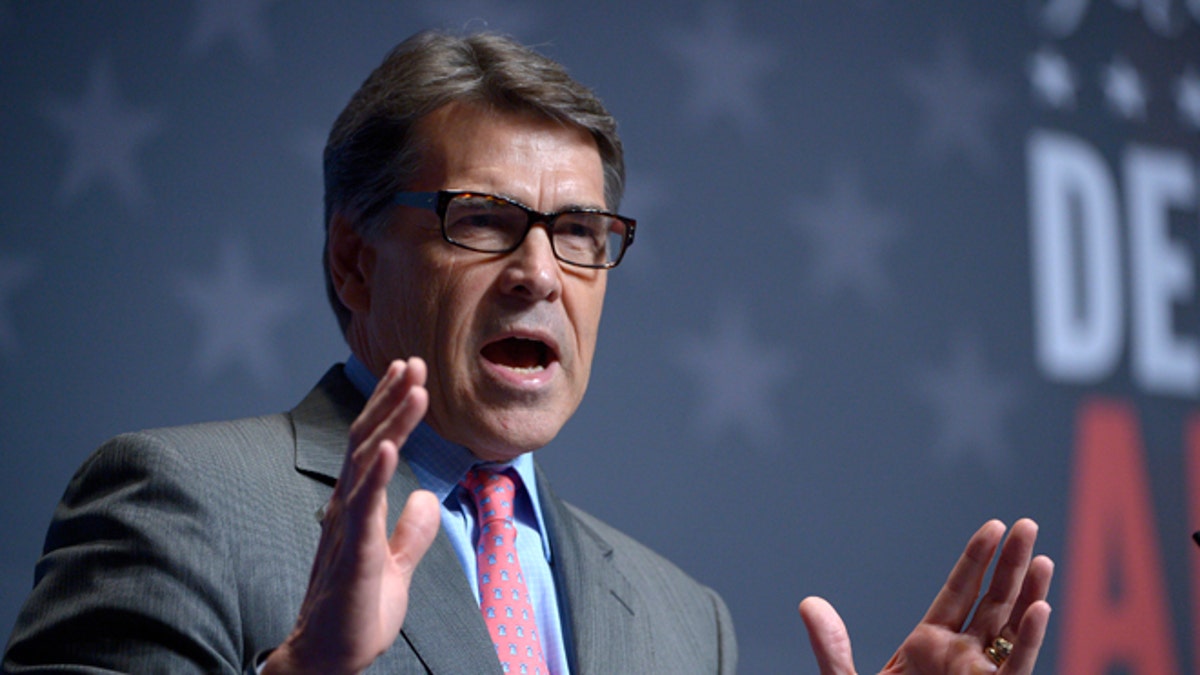
Aug 30, 2013: Texas Gov. Rick Perry addresses attendees of the Americans for Prosperity Foundation's Defending the American Dream Summit in Orlando, Fla. (AP)
ORLANDO, Fla. – Republican activists are taking solace in success stories by governors and legislatures in GOP-leaning states as their party tries to regroup after the disappointments of a bruising presidential contest and a stalled agenda in Washington.
Here's what fired up Washington-weary GOP stalwarts at a weekend conference of conservatives in this perennial swing state: pension overhauls in Wisconsin, tax cuts in Indiana and labor losses in Michigan.
Some of the biggest applause was reserved for governors who did not attend the event. The mere mention of Wisconsin Gov. Scott Walker, a tea-party favorite who won national attention for his battles with organized labor, prompted thunderous cheers. That was despite a speaking card full of potential presidential hopefuls, including Florida Sen. Marco Rubio.
Several GOP contenders, including Texas Gov. Rick Perry and Louisiana Gov. Bobby Jindal, used their appearances at the Americans for Prosperity summit to position themselves as Washington outsiders. While that strategy is hardly new, the appeals play to a Republican base starved for the kind of victories that gridlocked Washington has been unable to deliver.
"All roads lead back to the states," Perry said, as more than 1,000 activists roared their approval Friday. "I don't think the American people want to look to Washington, D.C. to solve the problems of the day. Washington D.C. is creating the problems of the day."
That set up an interesting dynamic, as Rubio was heckled for his support of immigration reform, his signature legislative issue. Attendees repeatedly interrupted him with cries of "No amnesty!"
The anti-Washington mood is likely to harden this fall as Congress faces deadlines to pass a budget or face a government shutdown. This week, Republicans negotiating with the White House said there was "no common ground" with the Obama administration, which wants to couple spending cuts with tax increases.
Both sides are bracing for a confrontation.
Immigration overhaul legislation is also in limbo after the Democratic-led Senate passed a far-reaching bill that includes a path to citizenship for the 11 million immigrants already in the country illegally. A majority of House Republicans remain opposed to such a provision, creating a potentially unbridgeable divide.
"It's not working from the top down, obviously," said Andre Adamski, a 47-year-old engineer from Lawrenceville, Ga.
On Friday, he was headed to a workshop on local tax overhauls while his wife, Mary, was primed for a social media boot camp. Self-described tea party activists who volunteered for Mitt Romney's campaign, both said they were refocusing their efforts on state politics.
The conference hall was filled with patriotic garb and anti-Obama memorabilia, including a book entitled "The Ultimate Obama Survival Guide." Some attendees said they were slowly returning to politics after the sting of last year's presidential loss.
"I didn't turn a TV on for months," said Greg Gormley, a 49-year-old sales director from Charleston, S.C. "This is my way to man up and see what I can do, whatever that is."
The weekend conference, sponsored by Americans for Prosperity, was aimed in part at motivating the advocacy group's foot soldiers at a growing number of state affiliates, which have played prominent roles in tax, education and gun-control debates across the country. Backed by the billionaire industrialists Charles and David Koch, the group spent $190 million on conservative causes in the past election cycle.
"I know things are difficult in D.C.," Tim Phillips, the group's president, told activists. "It can get frustrating, you can get down and depressed sometimes. But I tell you, do what we do -- get the heck out of Washington and get out to states."
Indeed, much of the summit's panels focused on grassroots organizing and local action.
At a session on President Barack Obama's health care law, panelists dismissed Washington-led efforts by Rubio and others to defund "Obamacare," and instead urged activists to fight at the state level to oppose one of the law's key provisions: expanding Medicaid, the federal and state program for poor people.
"The Medicaid fight is where we can make a difference," said Avik Roy, of the conservative Manhattan Institute.
Nearly half the states have opted out of the expansion, and organizers urged activists to keep pressure on GOP leaders, including Ohio Gov. John Kasich, who was elected in 2010 with tea party support but now favors expanding Medicaid.
When speakers addressed Washington they used it as symbol of government run amok. Rubio won a standing ovation for his pledge to vote against a budget that includes funding for the federal health care law. "Big government is doing what it has always done: It is failing," he said to cheers.
Jindal said he was "angry this government is using its power -- the IRS, the NSA, the Department of Justice -- to go after innocent, law abiding Americans." He brought the crowd to its feet with the declaration that "there is a rebellion brewing in these states."
Still, for now, conference organizers told activists to take solace in local victories.
"We're going to take back Washington too," Phillips said, "we're just going to need a little more time."











































